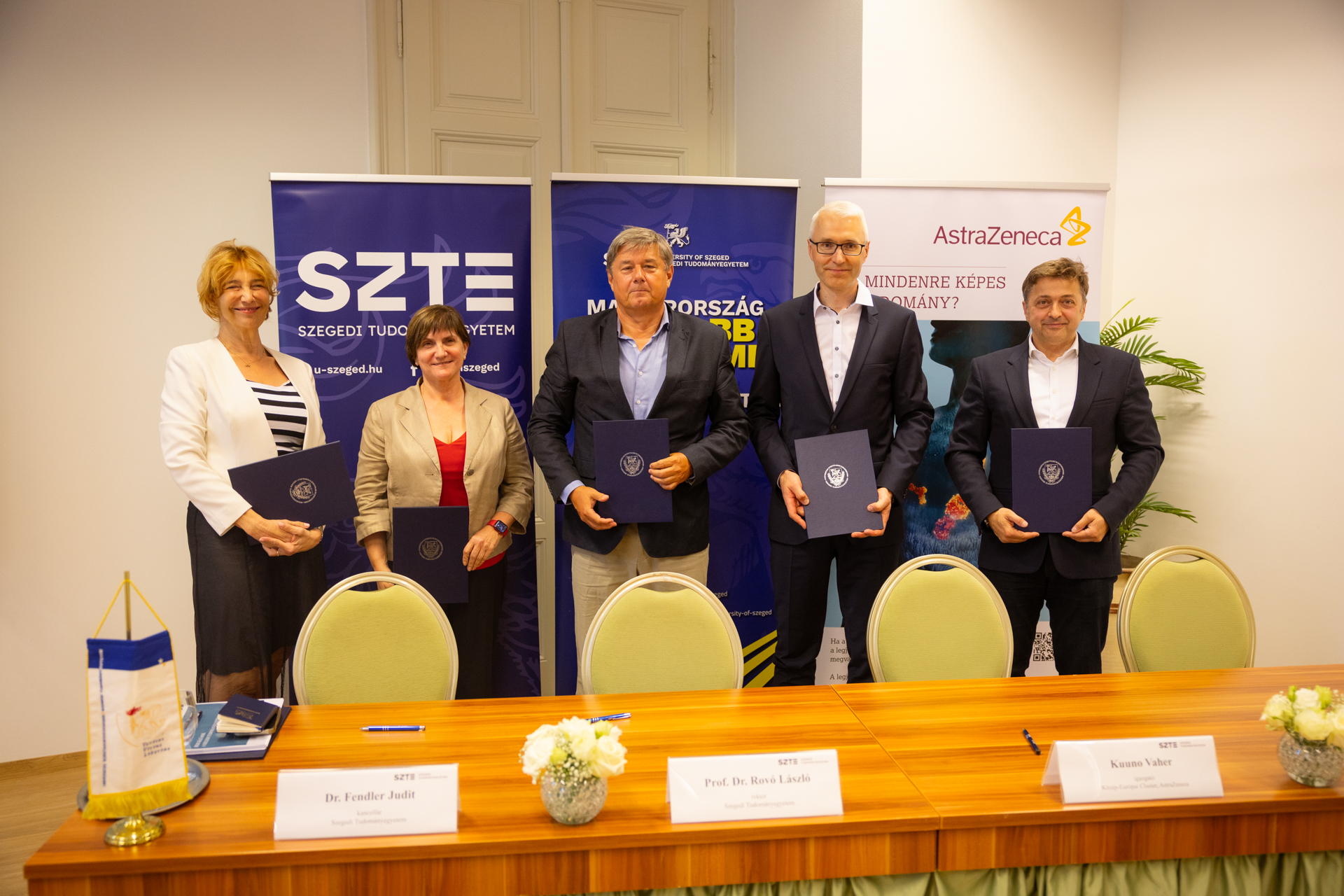
The University of Szeged and AstraZeneca have taken their partnership to the next level. As part of their new strategic alliance, the two organizations are working together to advance data-driven health research, continue to develop clinical research programs, expand the medical knowledge base, promote widespread educational outreach, and launch initiatives targeting both major public health issues and rare diseases. These joint projects are expected to improve patient pathway management and contribute significantly to scientific and professional engagement – both in Hungary and internationally.
In recent years, artificial intelligence and data science have brought groundbreaking innovations to many areas of Hungarian healthcare. However, meaningful progress is often hindered by the fragmented nature of individual development efforts. To foster more effective knowledge sharing and unlock the full potential of collaborative innovation, AstraZeneca and the University of Szeged are now transforming their working relationship into a strategic partnership.
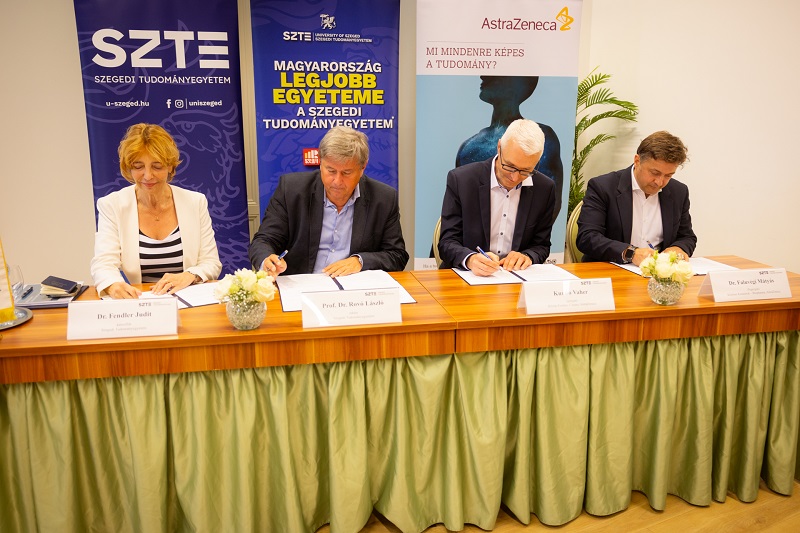
Dr. Judit Fendler, Prof. Dr. László Rovó, Kuuno Vaher, and Dr. Mátyás Faluvégi.
Photo by Ádám Kovács-Jerney
“The two organizations have already worked together effectively across several fields. Building on this foundation, one of the main goals of the new agreement is to broaden the scope of joint clinical research,” said Dr. Mátyás Faluvégi, Biopharma Country Director for Clinical Research at AstraZeneca. The strategic partnership also focuses on improving patient pathway management through the analysis of extensive patient data; advancing the prevention and treatment of widespread public health issues and various medical conditions; and expanding medical knowledge and educational outreach at both national and international levels.
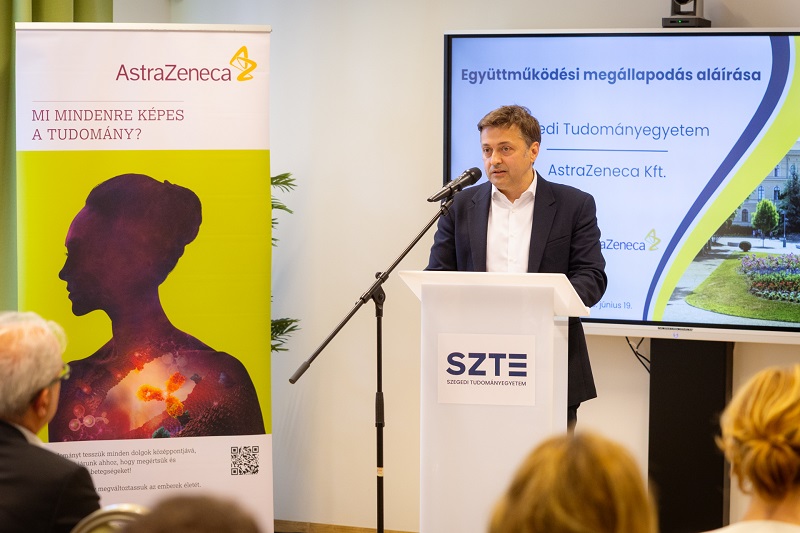
Dr. Mátyás Faluvégi
Photo by Ádám Kovács-Jerney
Harnessing data for prevention
Recent advances in health research and development, especially in targeted data collection and analysis, are becoming increasingly important in Hungary. These innovations are not only enhancing the efficiency and quality of care but are also making a significant contribution to prevention efforts. Fully unlocking the potential in this area requires close collaboration among all stakeholders, including research institutions, healthcare providers, and industry actors with access to extensive international data resources. The insights generated through these efforts can also form a strong foundation for future health policy decisions.
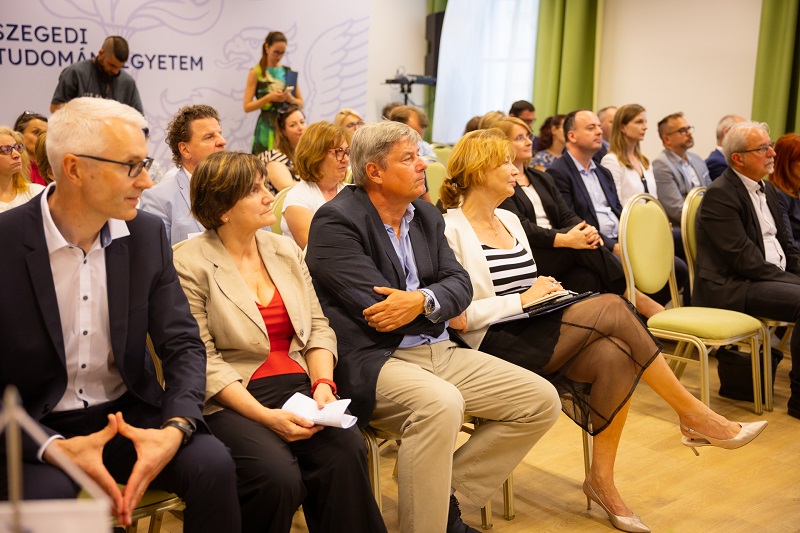
Photo by Ádám Kovács-Jerney
“The University of Szeged is in a unique position thanks to its organizational structure, which enables us to fully participate in the growing efforts focused on the prevention and treatment of diseases” – explained Prof. Dr. László Rovó, Rector of the University of Szeged, at the event. “We have clinics, research centers, and educational institutions that serve people of all ages across the region – from the youngest to the oldest. This means we are able to treat, do research, and educate. In fact, we’ve already begun collaborating with AstraZeneca’s experts in these areas, from shared strategic thinking to hands-on activities. To fully harness the power of knowledge sharing and joint innovation, we are now elevating our partnership with AstraZeneca to a strategic level.”

Prof. Dr. László Rovó delivering his welcome address
Photo by Ádám Kovács-Jerney
Powering regional healthcare through strategic collaboration
As Prof. Dr. Ildikó Csóka, Director-General for Strategic Affairs at the University of Szeged, emphasized, reaching a new level of collaboration with an industry partner is always a significant milestone – one that reflects a shared set of values. A strategic framework agreement of this scale – spanning education, research, and healthcare – helps SZTE to better fulfill its mission of supporting healthcare delivery in the Southern Great Plain region of Hungary and of closely integrating research, education, and patient care. Through these efforts, the university reinforces its commitment to providing the highest possible standard of healthcare for the local population.
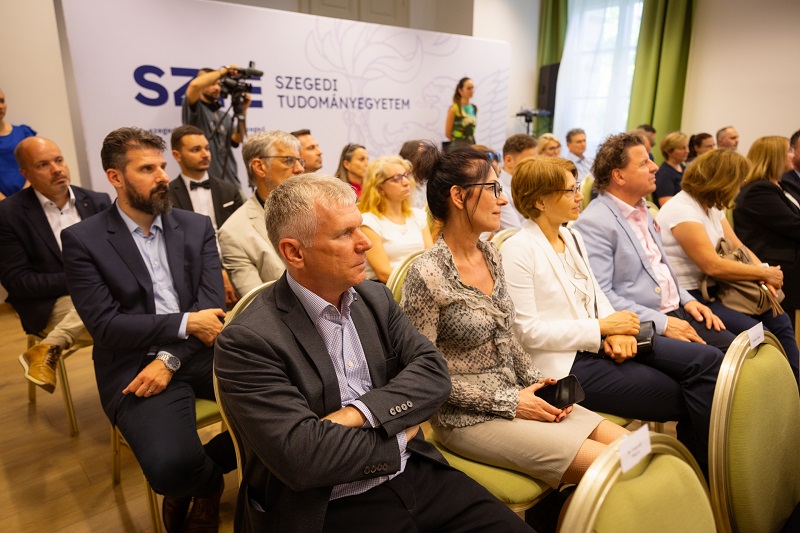
Photo by Ádám Kovács-Jerney
“We are committed to ensuring that innovative ideas – whether they come from our industry partners, our researchers, or our clinical professionals – are able to connect and progress as swiftly as possible,” said Prof. Dr. Ildikó Csóka. “Our goal is to build a genuine ecosystem where theory, practice, and industry collaboration converge – because everything is interconnected. We’re working to align these capacities and foster the right synergies between the company and the university’s staff, so that a more cohesive model of cooperation can take shape.”
Targeting widespread chronic diseases

Kuuno Vaher, Director of AstraZeneca’s Central European Cluster
Photo by Ádám Kovács-Jerney
“AstraZeneca’s broad portfolio and global presence allow us to share our experience and data across a wide range of therapeutic areas – including cancer, cardiovascular, renal and metabolic diseases, rare disorders, as well as respiratory and immunological conditions,” said Kuuno Vaher, Director of AstraZeneca’s Central European Cluster. “Implementing complex treatment protocols in today’s clinical practice and introducing new therapies require extensive collaboration – not only in scientific and clinical research, but also in medical education and public outreach. Hungary offers a strong foundation for data science projects, with a robust scientific community, advanced digital infrastructure, and a spirit of innovation. We believe that through our joint efforts, we can move closer to more effective treatments for many diseases.”
Source: SZTEinfo
Feature photo (left to right): Dr. Judit Fendler, Dr. Ildikó Csóka, Prof. Dr. László Rovó, Kuuno Vaher, and Dr. Mátyás Faluvégi
Photo by Ádám Kovács-Jerney

